|
|
|
Sort Order |
|
|
|
Items / Page
|
|
|
|
|
|
|
| Srl | Item |
| 1 |
ID:
158991
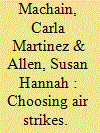

|
|
|
|
|
| Summary/Abstract |
Under what conditions do states choose to use only air power? Air strikes are one of many tools states use to promote their interests in the international system. Given that not all policy tools are appropriate for all crises, we explore when states choose to use air strikes as a coercive tool. We empirically test both common perceptions and newly derived hypotheses on the characteristics of states that employ air-only campaigns and the settings in which they do so, using newly collected data on the uses of air power during international crises between 1908 and 2006. Looking at the events that trigger the crises and the salience of the issues at stake, alongside the characteristics of the states involved, provides a clearer picture of when states use air power versus other coercive tools. Our research indicates that air-only campaigns are more likely to be initiated by militarily powerful states, but that in higher stakes crises, states are more likely to use ground troops or ground and air forces in combination.
|
|
|
|
|
|
|
|
|
|
|
|
|
|
|
|
| 2 |
ID:
158992
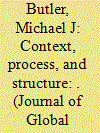

|
|
|
|
|
| Summary/Abstract |
When and in what circumstances do states turn to conflict management to manage a crisis? This article identifies a set of contextual, processual, and structural variables, examining the presence and strength of their associations with the likelihood of states employing conflict management in a foreign policy crisis. I conduct an empirical analysis of more than one thousand foreign policy crises between 1918 and 2013, using the International Crisis Behavior (ICB)-2 dataset, and with the data seek to craft a comprehensive model with the capacity to reliably predict when states will turn to conflict management in a foreign policy crisis based on the context and dynamics of a crisis as well as the attributes of crisis actors. My analysis suggests that states are more likely to employ negotiation, mediation, adjudication, and arbitration in foreign policy crises where the appeal, utility, and experience of violence is diminished; in crises involving weak, nascent, and/or transitional political entities; in crises involving fewer actors and/or crises not embedded within protracted conflicts; and in crises in which International Governmental Organizations (IGOs) are significantly involved.
|
|
|
|
|
|
|
|
|
|
|
|
|
|
|
|
| 3 |
ID:
158989
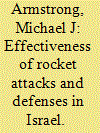

|
|
|
|
|
| Summary/Abstract |
This empirical article studies rocket attacks and defenses in Israel during operations Protective Edge, Pillar of Defense, and Cast Lead, and also during the Second Lebanon War. It analyzes publicly available counts of rockets fired, fatalities, casualties, and property damage. The estimates suggest that interceptor deployment and civil defense improvements both reduced Israel's losses slightly during Pillar of Defense and substantially during Protective Edge. They also imply that interceptor performance during Pillar of Defense may have been overstated. Ground offensives were the most expensive way to prevent rocket casualties. Interceptors were at least as cost-effective as military offensives, and their advantage improved over time. Without its countermeasures, Israel's rocket casualties could have been more than fifty times higher during Operation Protective Edge. These results imply that Israel's rocket concerns were more justified than critics admit, but its military operations were less worthwhile than intended.
|
|
|
|
|
|
|
|
|
|
|
|
|
|
|
|
| 4 |
ID:
158988


|
|
|
|
|
| Summary/Abstract |
The second issue of JoGSS’ third volume begins with two articles that evaluate the effectiveness of different policy tools: rocket attacks to improve Israeli security and economic sanctions to increase global respect for human rights. Michael Armstrong analyzes the effectiveness of rocket attacks and defenses in Israel during operations Protective Edge, Pillar of Defense, and Cast Lead, and during the Second Lebanon War. Using publicly available counts of rockets, fatalities, casualties, and property damage, he claims that Israel's rocket attacks were more justified than critics admit, but less worthwhile than the government intended.
|
|
|
|
|
|
|
|
|
|
|
|
|
|
|
|
| 5 |
ID:
158996
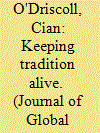

|
|
|
|
|
| Summary/Abstract |
The just war tradition is one of the key constituencies of international political theory, and its vocabulary plays a prominent role in how political and military leaders frame contemporary conflicts. Yet, it stands in danger of turning in on itself and becoming irrelevant. This article argues that scholars who wish to preserve the vitality of this tradition must think in a more open-textured fashion about its historiography. One way to achieve this is to problematize the boundaries of the tradition. This article pursues this objective by treating one figure that stands in a liminal relation to the just war tradition. Despite having a lot to say about the ethics of war, Xenophon is seldom acknowledged as a bona fide just war thinker. The analysis presented here suggests, however, that his writings have much to tell us, not only about how he and his contemporaries thought about the ethics of war, but about how just war thinking is understood (and delimited) today and how it might be revived as a pluralistic critical enterprise.
|
|
|
|
|
|
|
|
|
|
|
|
|
|
|
|
| 6 |
ID:
158995
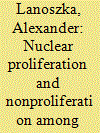

|
|
|
|
|
| Summary/Abstract |
Most alliance-related explanations of nuclear proliferation and nonproliferation draw from US security relationships. Yet, the Soviet Union, too, exhibited variation in proliferation tendencies within its own system of alliances. Only one Warsaw Pact member—Romania—was interested in seeking nuclear weapons, whereas both of its East Asian allies—China and North Korea—pursued nuclear weapons. What explains this pattern of nuclear proliferation and nonproliferation among Soviet allies? I draw on deterrence theory to argue that the same logic that some scholars invoke to explain nuclear proliferation and nonproliferation among US allies can also shed light on patterns of proliferation and nonproliferation among Soviet allies; the quality of Soviet security guarantees varied across recipients in East Central Europe and East Asia, and this variation accounts for subsequent differences in levels of nuclear interest shown by Soviet allies. My claims challenge accounts that the United States and Soviet Union colluded to manage proliferation risks, as well as arguments that democratic states have unique advantages in making credible security guarantees.
|
|
|
|
|
|
|
|
|
|
|
|
|
|
|
|
| 7 |
ID:
158994
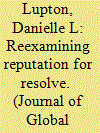

|
|
|
|
|
| Summary/Abstract |
Scholars remain conflicted over the effects of reputations for resolve on international conflict and which actors acquire these reputations. I address this debate by examining how our measures of resolve, as well as where we look for its effects, influence our conclusions about its impact on international conflict. Using data from the Archigos dataset and the International Crisis Behavior dataset, I perform a semi-parametric Cox survival analysis and directly compare the effects of resolute and irresolute behavior at two distinct levels of analysis: the leader level of analysis and the state level of analysis. My results show that target leaders who employ relatively more violent or more severe major responses to dispute triggers enjoy significantly longer periods of time before being the target of a future dispute initiated by the same challenger leader. While I also find a similar effect for target states that employ relatively more severe responses, the impact of resolute behavior at the state level of analysis does not appear to be as consistently widespread as that of resolute behavior at the leader level of analysis. My findings also show that how scholars choose to measure resolve as a concept can have important implications for their conclusions about its broader effects. Finally, my analyses present evidence that both leaders and states may be capable of acquiring reputations for resolve, opening up interesting avenues of future research.
|
|
|
|
|
|
|
|
|
|
|
|
|
|
|
|
| 8 |
ID:
158990


|
|
|
|
|
| Summary/Abstract |
Are economic sanctions an effective tool for the improvement of global human rights practices? Imposed economic sanctions seem to lead to increased target state repression. However, governments still impose sanctions for the expressed reason of the target's poor human rights practices. If sanctions are detrimental to the enjoyment of human rights, why do governments continue to use them in response to state repression? I argue that sanction activity may improve human rights practices in (1) states threatened with human rights–based economic sanctions and (2) nontarget states whose perceived cost of repression is increased by the example set by target states in their human rights and foreign policy peer groups. Using data on 159 countries from 1981–2005, I demonstrate that, while imposed sanctions are related to worsened human rights practices in target states, threatened human rights sanctions are related to increases in government respect for human rights in both target states and others whose human rights practices and foreign policies are similar to those of target states.
|
|
|
|
|
|
|
|
|
|
|
|
|
|
|
|
| 9 |
ID:
158993


|
|
|
|
|
| Summary/Abstract |
Why do some insurgent groups with associated electoral parties target civilians despite the costs of doing so? Organizations with peaceful electoral wings and violent factions operating at the same time are common in contemporary democracies. One of the more consistent observations in the literature is that insurgent targeting of civilians is costly to their electoral counterpart, and insurgents are aware of this cost. Yet, many insurgent groups continue to target civilians. In this article, we suggest a localized effect of violence on electoral outcomes of parties with ties to violent groups offers an explanation for why such insurgent groups might continue to perpetrate violence. Specifically, we suggest insurgent benefits, measured as electoral costs to the incumbent for failure in stemming the violence, likely outweigh the localized electoral costs to insurgent-affiliated parties from the violence. Our subnational analysis of violence and electoral results across Peruvian provinces strongly supports our story.
|
|
|
|
|
|
|
|
|
|
|
|
|
|
|
|
|
|
|
|
|